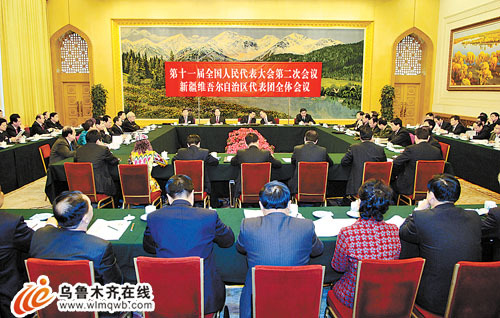"Ecological protection" is a constant topic of conversation among deputies and members from the Xinjiang Uygur Autonomous Region in group discussions during the ongoing annual sessions of the 11th National People's Congress and the 11th National Committee of the Chinese People's Political Consultative Conference, www.tianshannet.com.cn reported on March 10. They hope the region can ensure that its mountains remain green, its waters clear, and its sky a pristine blue, while continuing to develop the regional economy.
The current and future ecological situation in Xinjiang
Amanbayi Dawuti, deputy director of the Environmental Monitoring Center of the Kazak Autonomous Prefecture, said that Xinjiang suffers the heaviest desertification in the country, with the affected area expanding at an average annual rate of 85 square kilometers.
 |
|
During his talks with deputies from the Xinjiang Uygur Autonomous Region on March 7, Vice Premier Li Keqiang said Xinjiang played a very important role in the development of China. |
"Desertification poses a big threat to the region's oases. Direct economic losses caused by winds and sands exceed 3 billion yuan every year and the indirect costs are incalculable. Urban air and water pollution is so severe that it has already had an impact on industrial production, and on people's daily lives and health," he added.
Zhang Handong, secretary of the Altai Prefectural Party Committee, said that due to excessive grazing, 40 percent of the region's grasslands are badly depleted and 85 percent face desert encroachment to varying degrees.
"Traditional animal husbandry develops at the cost of a significant amount of ecological deterioration," said Zhang. "In Altai, desertification has reduced natural grasslands by half and affected the livelihood of 66 percent of herding communities." The secretary is sufficiently concerned about the situation that he has submitted proposals about the settlement of herding communities to the NPC in two consecutive sessions.
Shi Jianyong, head of the Bayin'gholin Mongol Autonomous Prefecture, said Lake Bosten, a freshwater lake located 57 km northeast of Korla and covering an area of about 1,000 square kilometers, has also faced drastic ecological deterioration in recent years.
"The ecology of the whole lake area will wither away if we don't take thorough preventive steps," Shi said, adding, "The lake's ecological protection project should be included in the state's main river and lake protection program."
Economic development and environmental protection advance abreast
Zhang Jixun, director of the region's State-owned Assets Supervision and Administration Commission, said the contradiction between economic growth and environmental protection has long existed and is becoming more prominent as industrialization and urbanization advances.
Government at all levels should make a top priority of ecological and environmental protection, and take effective measures to protect resources and energy on which herding communities rely for existence, he added.
Yuan Ze, board chairman of the Xinjiang Nonferrous Metal Group, said that his company gives priority to energy-saving and environmental protection in the process of mineral development and processing.
"We use up-to-date energy-saving and environmentally-friendly techniques, technologies, and equipment to produce high quality and high-grade products. The company makes substantial profits and at the same time contributes to environmental protection."
According to Zhang Handong, transforming traditional animal husbandry into modern animal husbandry hinges on the ecological protection of grasslands. "By developing artificial forage bases and conducting fencing projects on grasslands, the region can achieve the sustainable development of grassland ecology and animal husbandry," he said.
More support from the government
Jiang Ping, vice president of Xinjiang Agricultural University, suggested the region's soil erosion prevention projects be included in the state's main construction program.
CPPCC member Baikeli Mamuti said rapid economic development was accompanied by a growing demand for water for a whole range of uses: industrial and urban needs, oil development, animal husbandry, and eco-environmental protection. "How to use water scientifically and rationally has become a top priority. Water-saving is vital in order to balance supply and demand."
NPC deputy Yang Huizhu said ecological protection was a cause for the whole of society. "The government must make use of all of its functions, and enterprises and individuals need to play their part."
Director Zhang Jixun said that, as a major resource-rich region, Xinjiang should work hard to develop a recycling economy by promoting strategic rationalization of its oil and chemical industry structure, promoting a high-tech industrial system, scrapping outdated equipment, and ensuring a switch from investment-intensive economic growth to a model based on effective scientific and technological investment.
(China.org.cn by Li Jingrong, March 11, 2009)